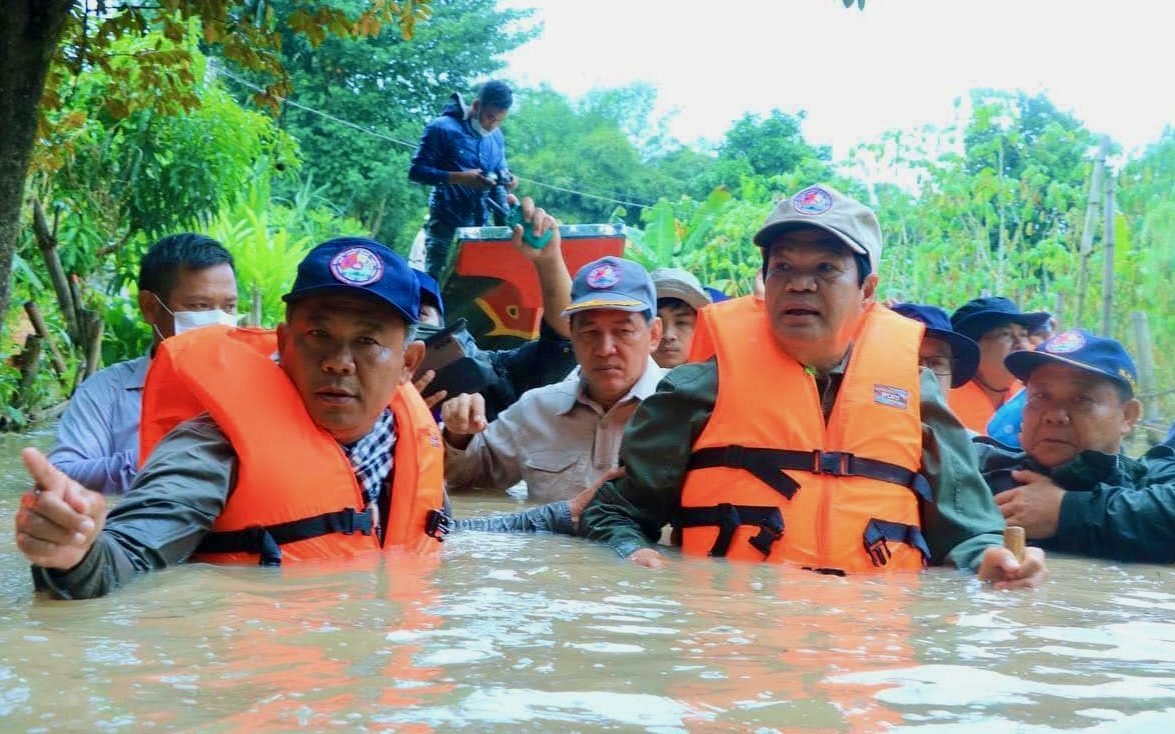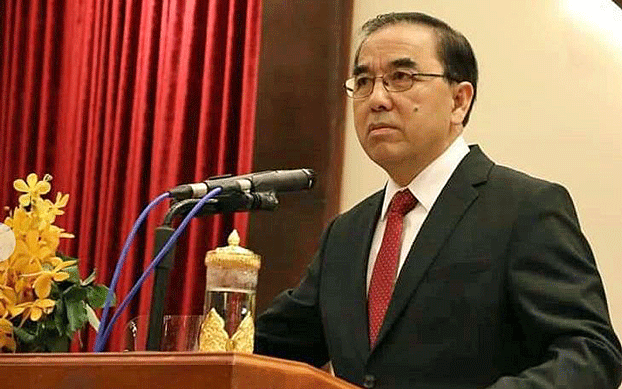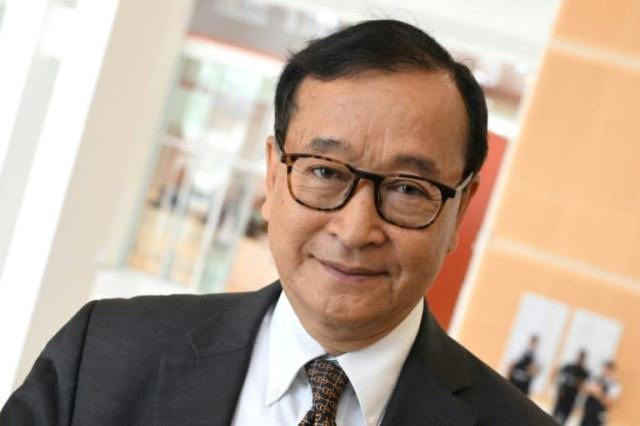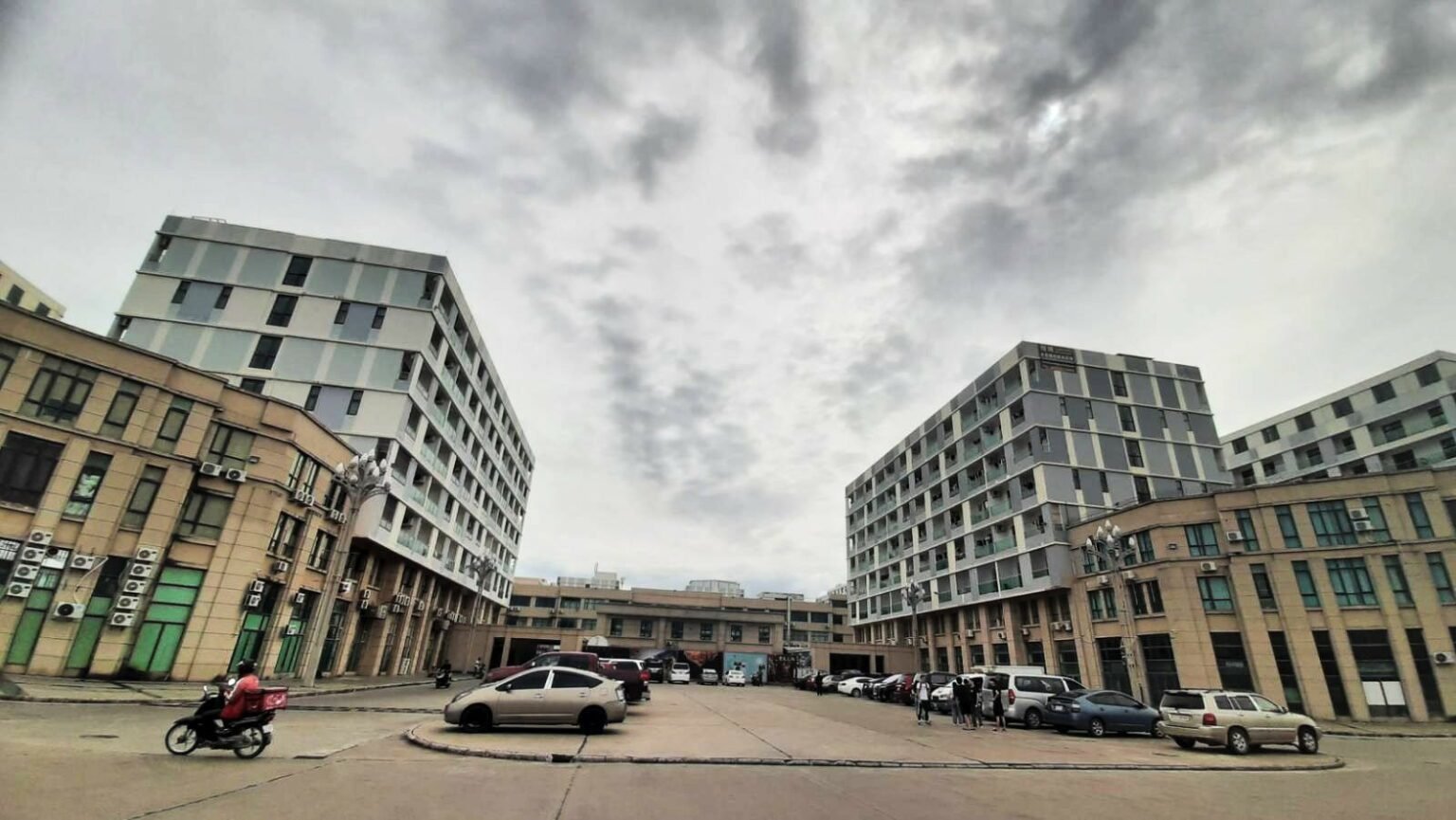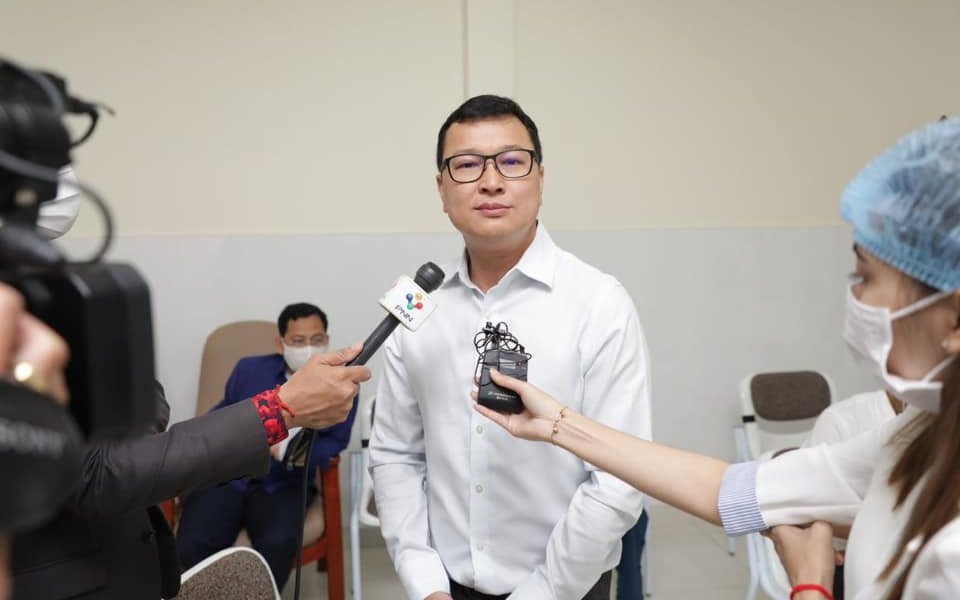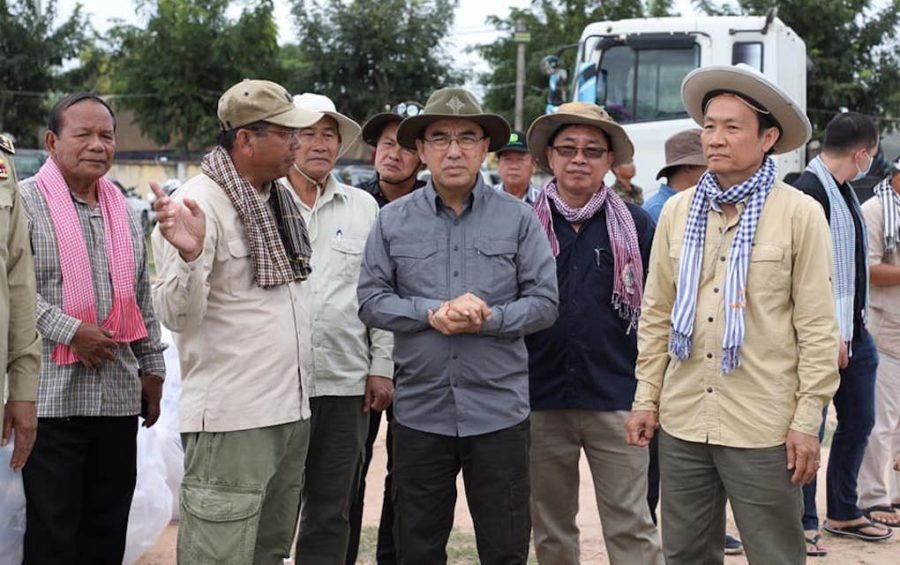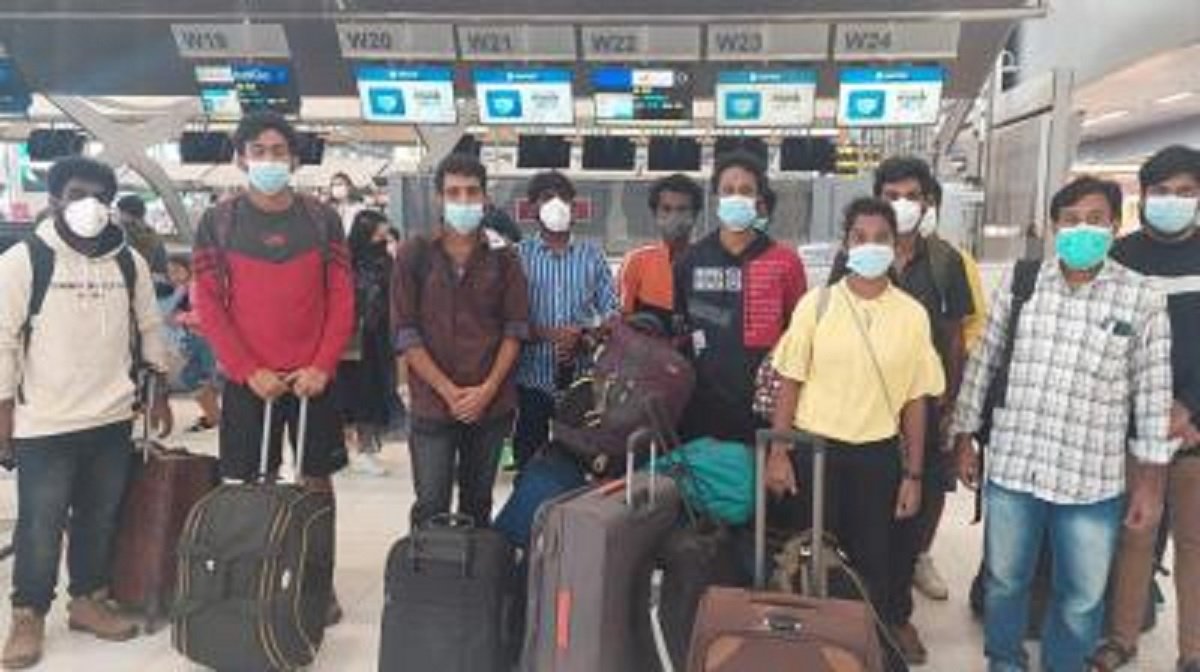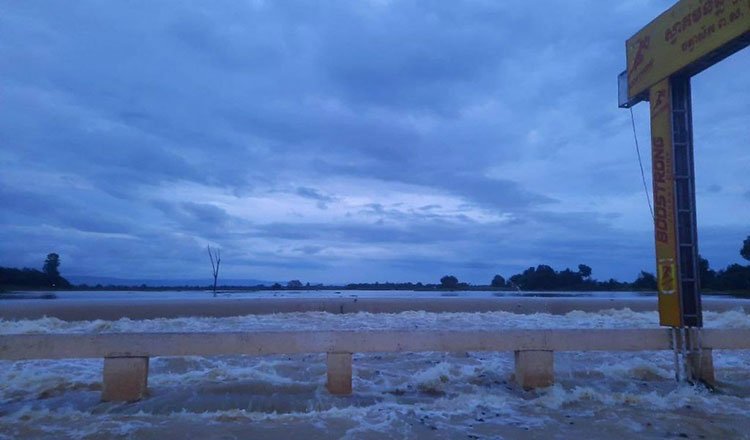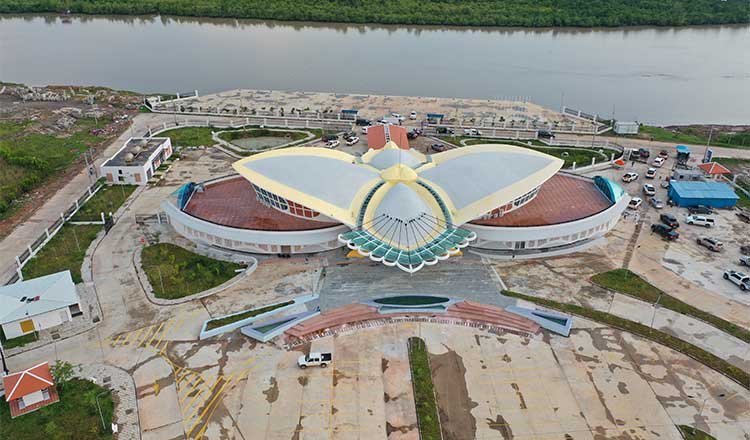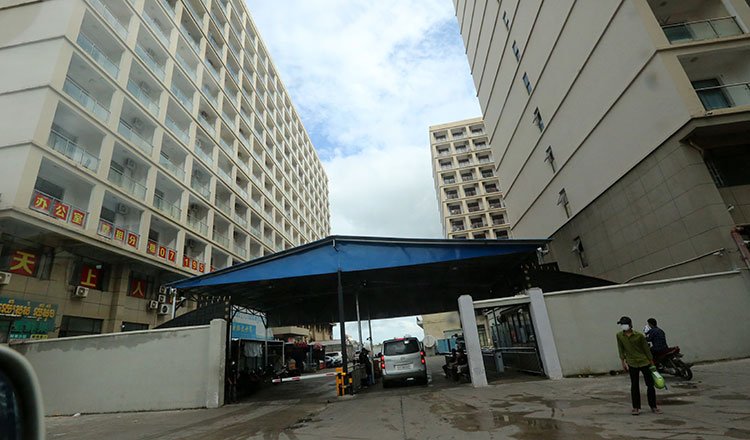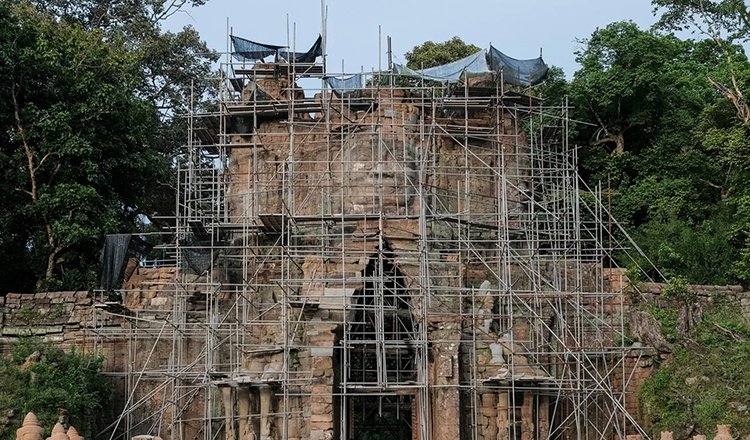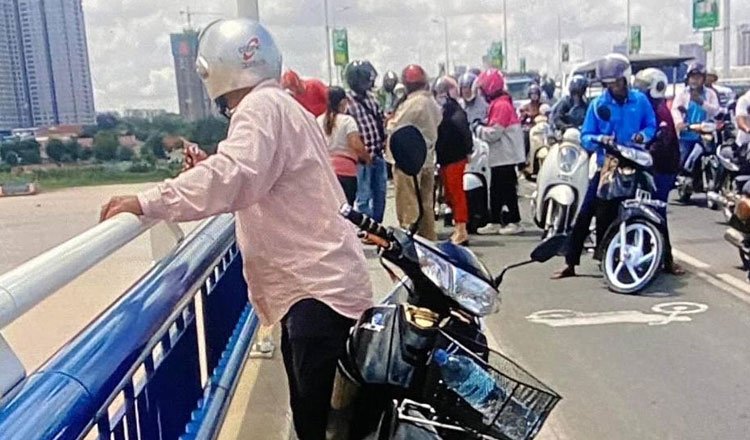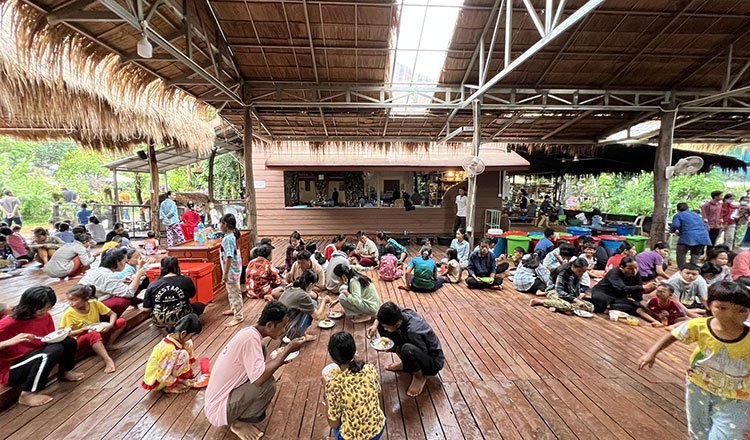-
Posts
15,789 -
Joined
-
Last visited
Content Type
Events
Forums
Downloads
Quizzes
Gallery
Blogs
Everything posted by geovalin
-
Severe flooding in Banteay Meanchey has hit 36,000 hectares of rice fields and 3,000 cassava farms — and driven snakes into warm kitchens where they have now bitten 300 residents, authorities said. Over the past month, heavy rain has inundated the western province, affecting 14,000 homes and causing the evacuations of almost 1,400 families, deputy provincial administration director Nong Vuthy said on Tuesday. But snakes have also been fleeing the floodwaters too, Vuthy said. “They get cold and try to find somewhere warm like a kitchen. But people don’t realize it,” he said. “Snakes are also like people trying to find a safe place. Their homes are also flooded so they need to run too.” About 300 people have been bitten over the past month, and they have been treated or taken to hospital, and no one has died, Vuthy said. Anticipating the invasion, the administration ordered additional antivenom and put medical staff on alert. read more https://vodenglish.news/snakes-seeking-shelter-from-floods-bite-300-people/
-
The Ministry of Education wants the law to ban alcohol advertising in sports events and venues to be enacted as soon as possible to prevent the use of alcohol that affect children and youth. Undersecretary of State for the Ministry of Education Soeur Socheata said the ministry in the meanwhile is working with stakeholders to carry out awareness campaigns in schools to educate students on the ills of alcohol. “Factors that attract children and young people to drink alcohol are due to the influence of alcohol promotion in public places, education institutions, schools and via media,” she told the press during the speaking contest on Prohibition of Advertising of Alcohol Products in All Forms at Sports Events and Sports Venues yesterday. “I believe that with the will of the government and the participation of the General Department of Sports, through the dissemination of information on the disadvantages of alcohol advertising on various media, we hope that Cambodia can eliminate all forms of advertising on the digital media as soon as possible,” she said. read more https://www.khmertimeskh.com/501166813/ministry-pitches-for-no-alcohol-ad-at-sport-events/
-
Farmers have borne the brunt of the disaster. Cambodia’s Prime Minister Hun Sen fired his agriculture minister over the weekend, following the loss of tens of thousands of hectares of rice paddies and other crops in torrential flooding — a move farm groups welcomed Monday as a sign of more government attention to their plight. Agriculture Minister Veng Sakhon was replaced on Saturday by Aun Pornmoniroth, deputy prime minister and minister of economy and finance, who is now also acting minister of agriculture. “I call for an urgent cooperation between the Ministry of Agriculture, Forestry and Fisheries, and subnational authorities such as the National Disaster Management Committee to jointly make assessments on the scale of the damage and to prepare for transporting rice seeds and other plant seeds to be distributed to target areas,” Hun San said in a public audio message on Oct. 8. “It is a necessity, and we have to do it urgently.” A royal decree dated Oct. 8 and signed by King Norodom Sihamoni formally terminated Veng Sakhon without providing a reason and said that Hun Sen was in charge of implementing the decree. Farm groups and civil society activists welcomed the firing, and urged Hun Sen and the ruling Cambodian People’s Party to take similar actions with senior officials at other ministries who have been inactive and not responsive to the needs of the people. Theng Savoeun, president of the Coalition of Cambodian Farmer Community, noted that Hun Sen warned Veng Sakhon about his inaction on several occasions. His sacking “could relate to several factors that some of our farmers are facing with issues of lacking access to market, while others have been affected by the floods without proper intervention, [and] the failure to help provide seeds to farmers in times of need,” he told RFAs. “It shows the lack of responsibility during his term.” Theng Savoeun urged the government to consider sacking other officials at the Agriculture Ministry who are not performing their duties. Devastating floods caused by torrential rains following a severe drought in the Southeast Asian nation have destroyed almost 24,700 hectares of rice fields nationwide, according to a report by the National Disaster Management Committee (NDMC). More than 770 communes in 22 provinces across Cambodia had been affected, especially in the northern part of the country. Additionally, the floods damaged more than 133,230 hectares of rice paddy fields and nearly 11,850 hectares of mixed crops, the NDMC said. At least 20 people have died, and over 1,700 families have had to be evacuated. The NDMC said the rainy season, which usually ends in October, would continue until December this year due to the La Nina phenomenon that cools ocean surface temperatures in the Pacific Ocean and results in heavy rains in Southeast Asia every three to five years. The situation hasn’t boded well for farmers, hit hard first by the drought and now by heavy rains and flooding, given that agricultural activities are the main source of income for many Cambodians living in rural areas. Hun Sen requested that Heng Samrin, president of the National Assembly, arrange a vote of confidence for Dith Tyna, the current secretary of state of the Ministry of Mines and Energy, to be the new agriculture minister. Yang Saing Koma, an agriculture expert-turned-politician and the current chairman of the board of directors of the Grassroots Democracy Party, told RFA that Veng Sakhon appeared to be out of touch and had difficulty working with civil society and political parties. “It reflects the reality not just inside the Ministry of Agriculture,” he said. “Likewise, it happens among other ministries. It is just the fact that the Agriculture Ministry plays a vital role in Cambodia given the fact that it relates to so many people who are farmers and to the country’s economy,” he said. RFA could not reach Veng Sakhon for comment. Veng Sakhon faced criticism for irregularities during the bidding of licenses for importing pork to local markets and the seizure of thousands of acres of forest land by the wealthy around Lake Tonle Sap for their personal interest or ownership. The former minister also was involved in granting protected land near the Phnom Tamao Zoo to a private company for development, resulting in the clearance of several hectares of protected forest land. The project was later revoked by Hun Sen following public outcry on social media. Translated by Sovannarith Keo for RFA Khmer. Written in English by Roseanne Gerin. https://www.rfa.org/english/news/cambodia/agriculture-minister-10102022184301.html Copyright © 1998-2020, RFA. Used with the permission of Radio Free Asia, 2025 M St. NW, Suite 300, Washington DC 20036.
-
PARIS - A French court on Monday cleared veteran Cambodian opposition figure Sam Rainsy of all charges in defamation cases brought by the prime minister and a top police official of his home country. Cambodian Prime Minister Hun Sen and his son-in-law and deputy national police chief, Mr Dy Vichea, had filed complaints against France-based Rainsy, 73, over Facebook posts dating back to 2019. Mr Hun Sen contested Rainsy's allegation that he was behind the 2008 death in a helicopter crash of national police chief Hok Lundy, who was Mr Dy Vichea's father. "Hun Sen killed Hok Lundy using a bomb placed inside his helicopter," Rainsy claimed on Facebook. The leader of Cambodia's government "decided to murder Hok Lundy because he knew too much about Hun Sen's misdeeds", he added. Rainsy is the co-founder of the Cambodia National Rescue Party, the South-east Asian nation's main opposition movement. read more https://www.straitstimes.com/world/europe/cambodian-dissident-cleared-in-defamation-trial-in-france
-
Sihanoukville authorities have fielded 420 human trafficking complaints in 51 days, leading to 1,605 foreign nationals being marked for deportation, according to an official report. A statement issued by the National Committee for Counter Trafficking on Saturday said that between August 18 and October 4, authorities raided 10 locations in Sihanoukville based on trafficking victims’ 420 complaints, 229 of them related to kidnapping, torture, prostitution and illegal gambling, and found 2,760 foreign workers. Some 1,946 of the foreign nationals had passports, though 1,512 did not have work permits and were fined before being allowed to leave company premises, it said. In addition, 1,605 foreign nationals faced deportations as a result of the raids: Preparations are complete for 685 of the foreigners from 10 countries, while 920 others of 23 nationalities are still being processed, the statement said. read more https://vodenglish.news/2760-foreign-workers-found-in-sihanoukville-raids/
-
Dith Tina, Energy Ministry secretary of state and the son of Supreme Court president Dith Munty, has been put forward as the replacement for sacked Agriculture Minister Veng Sakhon. Sakhon was removed from his position by royal decree over the weekend, with Finance Minister Aun Pornmoniroth made acting minister. But Prime Minister Hun Sen also signed an official government request to the National Assembly to make Tina the new agriculture minister. Tina’s father is Supreme Court president Dith Munty, while another member of his family — Cambodia Microfinance Association vice chair Dith Nita — is married to Environment Minister Say Sam Al, the son of Senate president Say Chhum. The request, also signed on Saturday, was posted online by pro-government Fresh News on Monday. Sakhon’s removal came after public criticism from Hun Sen in February over not cooperating with other officials. read more https://vodenglish.news/supreme-justices-son-selected-for-agriculture-minister/
-
After years of painstaking research, silk which once adorned Cambodia is now back. Khmer Times went unearthing the whole process by talking to key persons involved who have restored the lost glory of the Kingdom After decades of research, Cambodia has started producing its first pure Khmer silk yarn in a bid to push back the import by supplying silk products made from the newly- and locally-developed raw material to both domestic and overseas markets, according to a prominent economist. Silk yarn is reeled from cocoons that are developed by silkworms raised with mulberry at farms to be woven to produce silk products such as shirts, neckties, bags, scarves, pillow covers, souvenirs and decorative materials that would be available in some shops under renovation that showcases the purity of Khmer silk yarn, national identity and civilisation in those products, according to the prominent economist. Mey Kalyan, senior advisor of the Supreme National Economic Council (SNEC), told Khmer Times that the year 2022 is the re-birth year of pure Khmer silk yarn like the early stage of the prosperity of the Roman Empire in the 15th or 16th century as this nationally identical raw material of cloth has been disappeared most likely for many decades, which has opened an opportunity for the imported to dominate the market, especially in the supply side. read more https://www.khmertimeskh.com/501165438/the-resuscitation-of-khmer-silk/
-
PHNOM PENH, Oct. 8 (Xinhua) -- Cambodian King Norodom Sihamoni on Saturday signed a royal decree to sack Minister of Agriculture, Forestry and Fisheries Veng Sakhon from his post. In the royal decree, the king said, "Veng Sakhon is dismissed from the post of the minister of the Ministry of Agriculture, Forestry and Fisheries." "Samdech Techo Hun Sen, Prime Minister of the Kingdom of Cambodia, must take responsibility to implement this royal decree from the day of signature," the king said. Sakhon, 62, had held the post of the minister of agriculture, forestry and fisheries since April 2016. It's rare that a minister is fired from a job in the Southeast Asian nation. No reasons were explained for the dismissal, but in February, Hun Sen warned to dismiss Sakhon for incompetence and non-cooperation with other government ministries. On Saturday, Hun Sen also made a decision, designating Deputy Prime Minister and Minister of Economy and Finance Aun Pornmoniroth as the acting minister of agriculture, forestry and fisheries, in addition to his current job. https://english.news.cn/20221008/df777d6b29bf4976b90769af690871c6/c.html
-
“Around 50 people have been rescued so far. We are trying to get back others too. We do not have the exact number of people captive in Myanmar. We are in touch with many Indians there,” MEA spokesperson Arindam Bagchi said on Indians stuck in Myanmar. New Delhi: Around 50 people from Myanmar and 80 from Cambodia who were held captive in fake job rackets have been rescued, India said on Friday and added a word of caution asking citizens to remain extremely careful of dubious jobs they accept. “Around 50 people have been rescued so far. We are trying to get back others too. We do not have the exact number of people captive in Myanmar. We are in touch with many Indians there,” MEA spokesperson Arindam Bagchi said on Indians stuck in Myanmar. He further added that some of these have been released from Myanmar’s captivity and some are with Myanmar police as they entered the country illegally. Over instances of similar job rackets in Laos and Cambodia, Bagchi said that our Embassies in Vientiane, Phnom Penh and Bangkok have been helping in repatriating people from there. https://newsroompost.com/world/india-rescues-50-people-trapped-in-job-rackets-in-myanmar-around-80-from-cambodia/5198065.html
-
PHNOM PENH, Oct. 8 (Xinhua) -- Flash floods have been hitting parts of Cambodia, leaving at least four people dead, Prime Minister Samdech Techo Hun Sen said on Saturday. In a voice message released publicly, Hun Sen said rainwater flooding has also forced the evacuation of a number of affected families to higher ground. He added that the floods have inundated 151,412 hectares of rice paddy and 41,024 hectares of other crops. "Water has receded at some places, but risen at some places, and according to weather forecast, there will be some more rains," Hun Sen said. "However, the situation is under control." He ordered Deputy Prime Minister and Minister of Economy and Finance Aun Pornmoniroth, who is also the acting minister of agriculture, forestry and fisheries, to assess the damage caused to rice paddy and other crops and advised him to prepare seeds to distribute to farmers for replanting when water recedes. Floods usually hit the Southeast Asian nation between August and October every year. Last year, flash floods claimed 11 lives and forced the evacuation of 172,297 people, according to an official report. http://www.china.org.cn/world/Off_the_Wire/2022-10/08/content_78455912.htm
-
The Kampot tourist port, which will play an important role in connecting sea tourism in Cambodia and neighboring countries, has been completed. The main tourist port in Kampot province is located next to Dang Prek, a tributary in Teuk Chhou district, about 6 km from Kampot city. Construction of the seaport on more than 4 hectares of land began in 2018 and was completed in June 2022. Necessary infrastructure have also been built to serve the berths of cruise ships and buildings for tourists. According to the report, the infrastructure includes: a port with a wharf of more than 123 meters long and more than 11 meters wide, passenger and restaurant buildings, roads, garbage collection facilities, technical buildings, public bathrooms, reservoirs, ponds and other facilities. Kampot Tourism Port was built under an ADB loan of more than $ 18 million. Construction process by the Ministry of Public Works and Transport. After the completion of construction on October 7, 2022, Deputy Prime Minister Aun Porn Moniroth, accompanied by Senior Minister Sun Chanthol, Minister of Public Works and Transport and Thong Khon, Minister of Tourism, visited the port. read more https://www.khmertimeskh.com/501165066/20-million-kampot-tourist-port-completed/
-
The Preah Sihanouk Provincial Administration has issued guidelines on the management of casinos, hotels, restaurants, condominiums and other business owners to prevent ‘detention, human trafficking, sex work, and crimes against Cambodian law.’ The issuance of this instruction is due to the fact that in the past, the Sihanoukville Provincial Administration has observed business locations, casinos, hotels, restaurants, condominiums and some businesses after obtaining business licenses from the Royal Government or from the Ministry, have not yet informed the provincial administration or the relevant authorities about the operation of their business and have not yet raised the name tag of their business location. The Sihanoukville provincial administration added that some locations were fenced off, making it difficult for authorities to inspect each location, and on the other hand, creating conditions for opportunists to commit crimes such as detention, human trafficking, sex work, and crimes against Cambodian law. read more https://www.khmertimeskh.com/501165131/preah-sihanouk-provincial-administration-issues-strict-guidelines-for-casinos-hotels-restaurants-condominiums-and-other-businesses/
-
The Takav Gate, one of the five gates of Angkor Thom, located to the west of Bayon Temple, will attract more tourists to visit and take pictures and become the new tourist destination, after the renovation project is completed. According to the APSARA National Authority, Angkor Thom’s Takav Gate had been in a state of disrepair due to age, climate, war, lack of care, while the four elephant sculptures at the corners had been severely damaged by trees and roots growing into the structure. A large part of the gate, especially the top of the gate, which had four Brahma faces, as well as the adjoining structures of the stone gates, had slipped out of its original position, with some of the stones falling down, requiring temporary support. and having used the cable for more than 10 years. There is still a high risk due to the decay of the tree, the loose cable, and the roots of the trees. read more https://www.khmertimeskh.com/501164714/takav-gate-to-become-new-tourist-destination-after-restoration/
-
A teenage girl became the latest victim of Phnom Penh’s infamous ‘suicide bridge’ yesterday. The incident took place at 12 noon on October 6, 2022 at the New Chroy Changva Bridge in Sangkat Chroy Changva, Khan Chroy Changva. The victim was named Cheng Srey Net, 15 years old. The unfortunate girl left behind a teddy bear as a poignant symbol of her despair read more https://www.khmertimeskh.com/501164579/phnom-penhs-suicide-bridge-claims-another-victim/
-
Chen Zhi was part of an investment group that bought into the company for more than $1.4 billion, sources told RFA. Cambodian Prime Minister Hun Sen and his Cuban counterpart, Manuel Marrero Cruz, agreed this week after meeting in Phnom Penh to forge closer ties between their two countries, signing pledges to cooperate on areas related to culture and sports. Two years ago, a key member of Hun Sen’s inner circle was forging his own links to the island nation through a secretive deal to purchase a stake in the Cuban state tobacco company, according to two sources familiar with the matter and corporate records. Chen Zhi, who was born in China but granted citizenship in Cambodia in 2014, is the founder of Prince Group of companies, one of the largest and most influential conglomerates in the Kingdom. It has interest in real estate, banking, finance, tourism and food and beverage companies among other businesses. Chen has been equally adept at navigating Cambodia’s political world, spending three years as an unpaid adviser to Interior Minister Sar Kheng, according to a 2017 announcement in the royal gazette. In October 2020, Hun Sen appointed Chen to be his own counselor with a rank equal to minister. The next year, in March, the Prince Group announced a $3 million donation to Cambodia to help it fight the pandemic. The same month that Chen ascended to become Hun Sen’s adviser, Imperial Brands, a U.K.-based tobacco company that includes the cigarette brand Winston, sold its 50 percent stake in Habanos S.A., a Havana-based company that distributes brands like Montecristo and Cohiba cigars, for €1.225 billion ($1.44 billion) to a secretive consortium of investors . Cuba’s state-owned tobacco company Cubatabaco owns the other half of Habanos. While the buyers had sought to remain anonymous, sources with direct knowledge of the matter told RFA that Chen was one of the investors who purchased a piece of Habanos. “Chen Zhi bought the company over a year and a half ago, but that was kept secret,” a regional tobacco industry professional told RFA, asking for anonymity as they were not authorized to speak to the press. Another individual with knowledge of Chen’s business dealings at the time of the deal told RFA that he was involved in the takeover. RFA’s source also named Hong Kong-listed casino operator Suncity Group Holdings as among the buyers of Habanos. Suncity’s billionaire CEO, Alvin Chau, was arrested in Macau last November following an investigation into illegal online gambling operations and money laundering. Chau pleaded not guilty to all charges as his trial commenced last month. “It’s owned by Chen Zhi and Suncity,” the second source told RFA, requesting anonymity for fear of repercussions. Suncity’s links to the deal were previously reported in May 2020 by Bloomberg, which noted that the group’s chief financial officer, Chiu King-yan, was listed as a director of the Hong Kong-registered Allied Cigar Corp. Allied was in turn the sole shareholder of a Spanish firm called Allied Cigar Corporation SL, which was set to take control of Imperial Brands’ half of Habanos, the joint venture with the Cuban government. Suncity denied to Bloomberg it had anything to do with the deal. In November 2020, control of the Allied Cigar Corporation SL shifted to Asia Uni Corp., Spanish corporate records show. Asia Uni Corp.’s latest annual report shows its shares are held by a company registered in the British Virgin Islands. The BVI’s stringent corporate secrecy laws make it hard to know the precise makeup of Asia Uni Corp.’s ownership. But a list of the company’s directors on the same annual return shows a connection to Chen. Among the company’s five directors is Qiu Wei Ren, a Cambodian citizen and director of companies owned by Chen in Hong Kong and Cambodia. Like Chen, Qiu was born in China but has become a naturalized Cambodian. The pair were both awarded medals by the Cambodian king in 2020 alongside a roster of other Prince Group executives, according to the royal gazette, which publishes government decisions in Cambodia. Hun Sen and Cuban Prime Minister Manuel Marrero Cruz inspect an honor guard during a meeting at the Peace Palace in Phnom Penh. Credit: AFP/Cambodia's government cabinet/Kok Ky Holiday in Havana Chen can be seen at the banquet Hun Sen threw this week in Phnom Penh welcoming Cruz to Cambodia in a photograph posted on the longtime Cambodian strongman’s Facebook page. Chen was also by Hun Sen’s side when, after he addressed the United Nations General Assembly in New York, the prime minister flew to Cuba on a Boeing business jet owned by controversial Chinese-businessman-turned-Cambodian-diplomat Wang Yaohui, according to an affidavit submitted to a Singapore court by one of Wang’s most trusted lieutenants. Wang has been the subject of recent investigative reports by RFA exploring his murky past in China and Africa and his rebirth in Cambodia, where he has sought legitimacy through political ties and secretive investments in a British soccer club. Photographs that were also posted to Hun Sen’s Facebook page show Chen among the entourage that met with Cuban President Miguel Diaz-Canel and National Assembly President Esteban Lazo Hernández. A press release on the Cuban National Assembly’s website also notes that Chen was present in his capacity as an adviser to Hun Sen. Prince Group’s chief communications officer, Gabriel Tan, asked RFA to direct any questions to the company’s PR agency Hill and Knowlton, which had not responded at the time of publication. https://www.rfa.org/english/news/cambodia/cigars-10072022161145.html Copyright © 1998-2020, RFA. Used with the permission of Radio Free Asia, 2025 M St. NW, Suite 300, Washington DC 20036.
-
Move comes after Son Chhay discussed ‘irregularities’ in the July commune elections. A Cambodian court on Friday ordered Son Chhay, vice president of the main opposition Candlelight Party, to pay more than U.S.$700,000 in damages for defamation, his lawyer told Radio Free Asia. Hun Sen’s ruling Cambodian People’s Party, or the CPP, and the National Election Committee, a supposedly impartial election monitor, brought two lawsuits against Son Chhay after he talked with a news outlet about election irregularities two days after the country’s commune elections on June 5. The Candlelight Party took about 19 percent of the country’s 11,622 local council seats in that vote, whereas the CPP captured about 80 percent. Son Chay said the results “do not reflect the will of the people, who were intimidated. Their votes were bought and stolen," Australia’s ABC News reported. And independent election monitors and NGOS reported irregularities. Those comments earned him defamation charges. In addition to having to pay 3 billion riels (about $726,000) to the ruling party, Son Chay was also slapped with fines totalling 17 million riels (about $4,100) that must be paid to the CPP, the election committee and the court, his lawyer Choung Chou Ngy told RFA’s Khmer Service. He criticized the decision, saying his client only expressed his political views and did not defame anyone. “What Son Chhay said was to advocate for election reform but the court convicted him and ordered him to pay 3 billion riels to the CPP. It is very unjust,” he said, adding that he intends to consult with his client about the appeal process. Son Chhay denied he was guilty of defamation and vowed to continue to criticize the election process until it is reformed. “What I have done was not to anger anyone or for anyone’s benefit,” he told RFA. “I talked about free and fair elections. [But] people don’t have freedom. People only express their views and are being arrested for defamation,” he said. RFA was not able to reach election spokesman Hang Puthea for comment, but the organization issued a statement saying that justice was served. “Through the verdict today, the NEC has been proven innocent, restoring its reputation and dignity as a national institution,” it said. The court shouldn’t have tried Son Chhay because he has the right to freedom of expression, Yi Soksan, a senior official with the Cambodian Human Rights and Development Association, told RFA. “It is sad when a political party files a complaint with the NEC to resolve election issues, and not only do they fail to resolve the issue, the institution that’s supposed to be a referee instead files a complaint against the political party,” he said. Friday’s verdict came amid discussions between Candlelight and the Khmer Will Party party over a potential merger ahead of the 2023 general election, scheduled for July. The Khmer Will Party’s president, Kong Monika, said a merger is what the people want, and would set an example for other political parties to prioritize national interest over personal ones. “The Khmer Will Party is the same as the Candlelight Party. We want supporters of democracy to stay united for a positive change,” he told RFA. The Candlelight Party is eager to join hands with Khmer Will, Thach Setha, the party’s vice president, told RFA. Ruling party spokesman Sok Ey San downplayed the significance of the two parties merging. He said that the opposition has still not recovered from 2017, when the Supreme Court dissolved the Cambodia National Rescue Party, or CNRP, which at that time had been the main opposition party. “The CPP is not afraid. The CNRP lost to the CPP. Now the CNRP has split up to at least seven parties, and only two of those will merge so the CPP is not worried,” he said. The Khmer Will Party did not win any seats in the communal election, garnering only 7,556 votes nationwide. Translated by Samean Yun. Written in English by Eugene Whong. https://www.rfa.org/english/news/cambodia/son_chhay-10072022180625.html Copyright © 1998-2020, RFA. Used with the permission of Radio Free Asia, 2025 M St. NW, Suite 300, Washington DC 20036.
-
After making inaccurate predictions repeatedly, League for Democratic Party (LDP) president Khem Veasna and his cronies are trying very hard to convince people to accept his final prediction that the earth will be flooded within the next 10 days and the end of the world will occur. Veasna claimed on his Facebook page yesterday that he is the (God of Creation) Brahma so he knows about how the earth is moving, adding that this is his final prophesy. Some of his followers also posted propaganda about their belief that he is Brahma and the final prediction is accurate One of them, Komsot Ker, warned unbelievers not to insult them. He said that if they do so they will perish in the flood since they insulted Brahma, and the deluge will come within the next ten days. Another follower Chak Riya said that all sinful people who do not believe in Veasna will suffer a horrible death from a flood, adding that if they wish to repent and live, they should believe and travel to Siem Reap province where the doomsday believers are gathered. read more https://www.khmertimeskh.com/501164018/veasna-and-cronies-ramp-up-doomsday-prediction/



